It seems we can’t find what you’re looking for. Perhaps searching can help.
Sign Up for newsletter!
Subscribe to get the latest eBook!
Hotline







According to research from Omnisend, campaigns that use three or more channels achieve a purchase rate approximately 287% higher than single-channel campaigns. Omnichannel customers also have an average lifetime value around 30% greater than customers who shop through only one channel. In today’s highly competitive landscape, adopting AI in omnichannel retail is no longer a “nice-to-have” but a “must-have”.
This article explores how AI-driven omnichannel strategies are revolutionizing the retail landscape, offering businesses new ways to leverage technology for long-term, sustainable growth
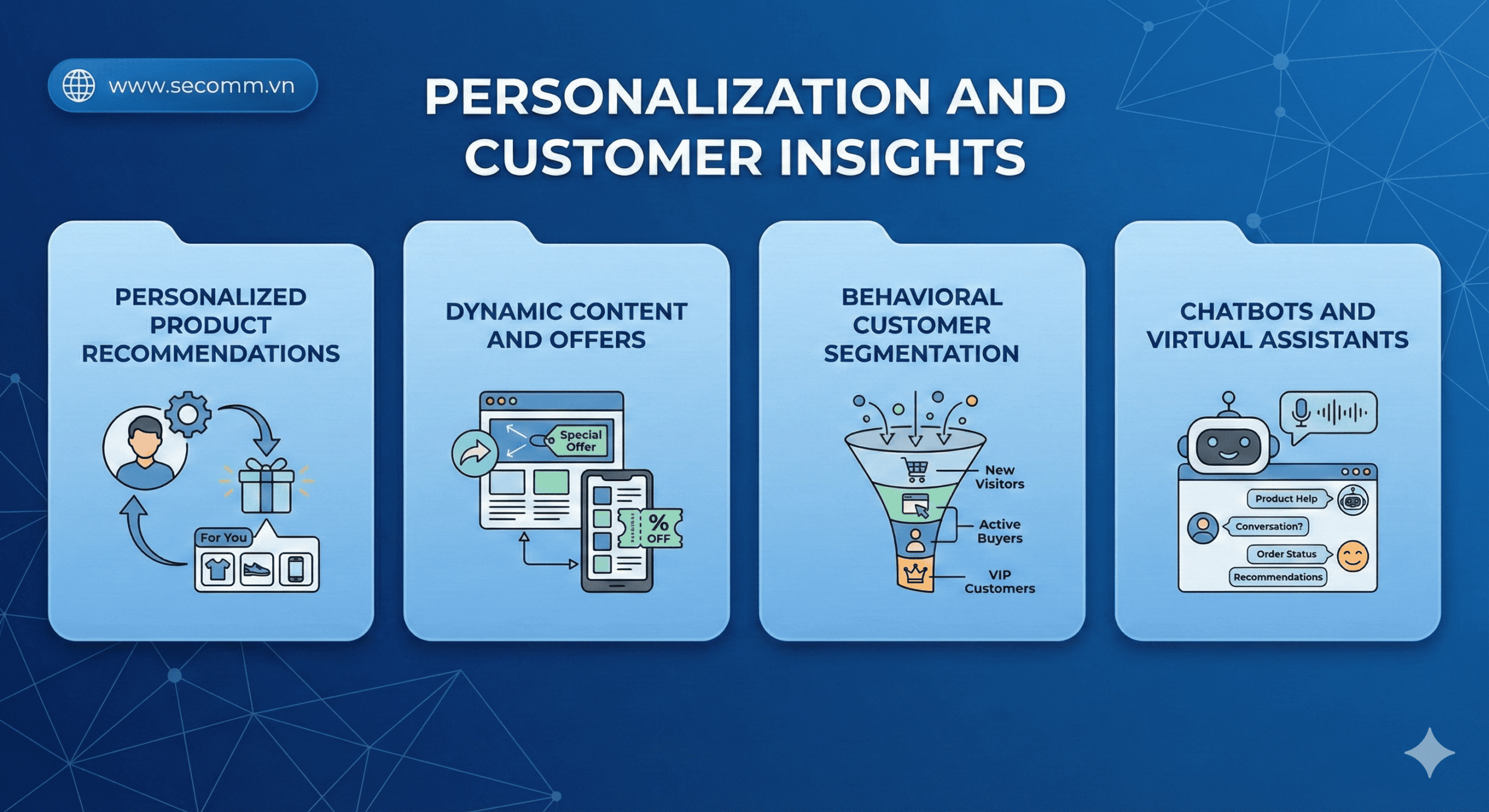
AI enables retailers to deliver personalized experiences by leveraging customer data from multiple sources. With machine learning (ML) algorithms, businesses can analyze browsing behavior, purchase history, and even social media interactions to build a comprehensive customer profile. This profile is then used to power product recommendations, services, and content tailored to each individual. Key AI applications in personalization and customer intelligence include:
AI-driven recommendation engines analyze data across all channels to suggest the most relevant products to each customer, thereby increasing conversion rates. For instance, when a shopper searches for a product on a mobile app, AI algorithms can recommend related items based on their purchase history and browsing behavior across platforms. Around 80% of consumers are willing to buy more from brands that offer a personalized experience.
With AI, retailers can trigger timely promotions for the right customer segments. If a shopper views a product on the website but leaves without purchasing, AI can automatically send a personalized discount code via email or mobile push notification to encourage them to return and complete the order. This approach boosts engagement and significantly reduces cart abandonment.
AI supports behavioral segmentation, allowing retailers to cluster customers based on how they shop and interact with the brand. Frequent shoppers can be rewarded with VIP privileges, while low-frequency customers can be targeted with limited-time offers designed to re-engage them and increase purchase frequency.
AI-powered chatbots deliver personalized support by accessing customer profiles, order history, and browsing activity. Operating 24/7, chatbots can handle FAQs, assist with product discovery, and even cross-sell or upsell complementary items to increase average order value. A survey from PwC indicates that roughly 87% of consumers believe AI has improved their shopping experience, and 73% are willing to use AI chatbots for customer service during their purchase journey.
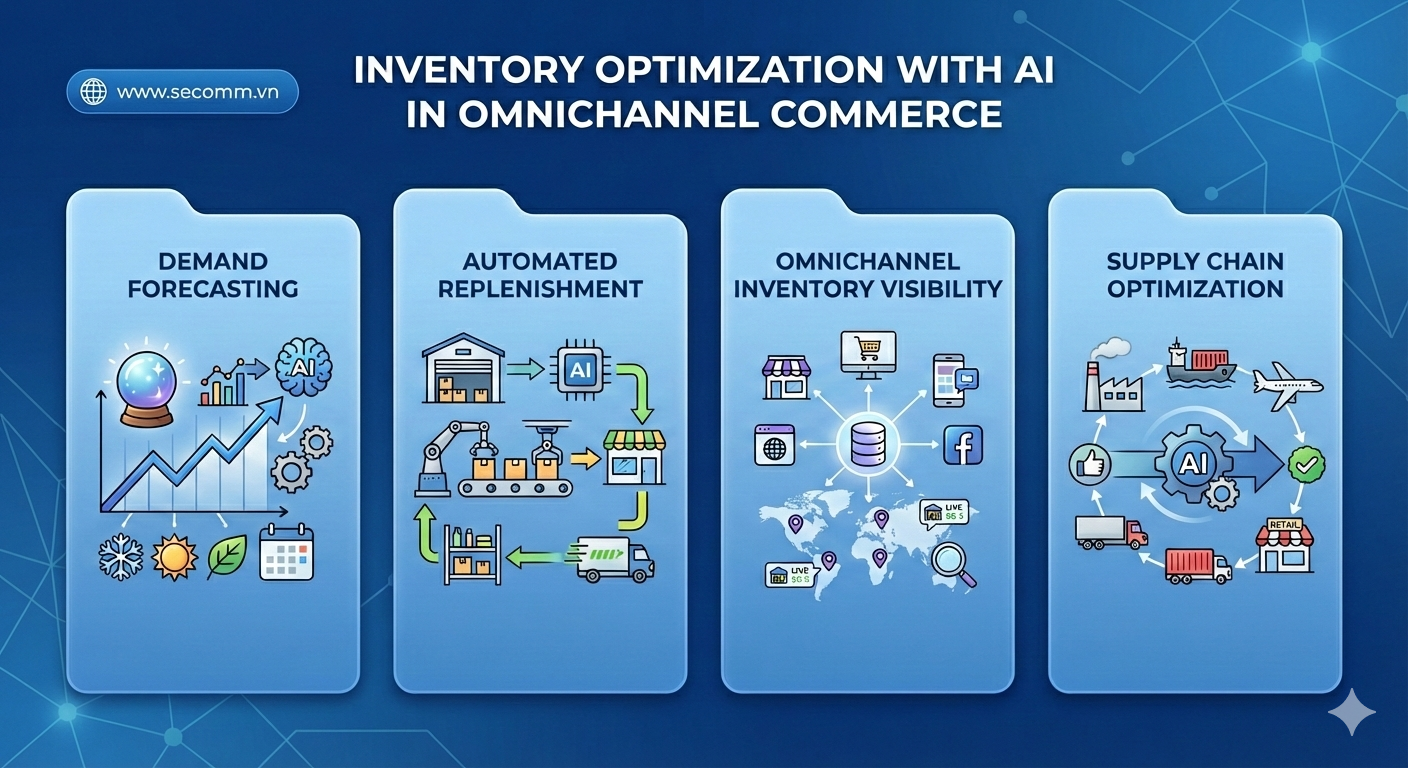
Inventory management in a traditional omnichannel environment is complex and often leads to stockouts or overstock. AI-powered inventory management systems streamline this process, enabling retailers to maintain optimal stock levels across all channels.
AI can forecast future demand by analyzing historical sales data, current trends, and external factors such as seasonality. With more accurate demand forecasting, retailers can avoid both out-of-stock situations and excess inventory, reducing markdowns and storage costs. Studies show that AI-driven demand forecasting can reduce forecast error by up to 30%.
Leveraging predictive analytics, AI can automate replenishment orders so that best-selling products are always available while minimizing the risk of dead stock. AI can also detect regional demand differences, allowing businesses to fine-tune inventory levels at each store. This creates a more responsive supply chain and can reduce stockout events by up to 40%.
AI provides real-time inventory visibility across all channels: online, in-store, and warehouse. Customers benefit from accurate stock information, while retailers can confidently implement services such as “Buy Online, Pick Up In-Store” (BOPIS) without operational friction. This level of visibility also supports more efficient inventory allocation, especially during peak demand periods.
AI-driven supply chain analytics help retailers optimize logistics and distribution. Algorithms can determine the most efficient delivery routes, streamline warehouse operations, and predict potential disruptions. This is particularly critical for retailers offering same-day or next-day delivery, where AI can identify the fastest and most cost-effective path from fulfillment centers to customers.
Read more: What is eCommerce Integration? Foundation of eCommerce Automation
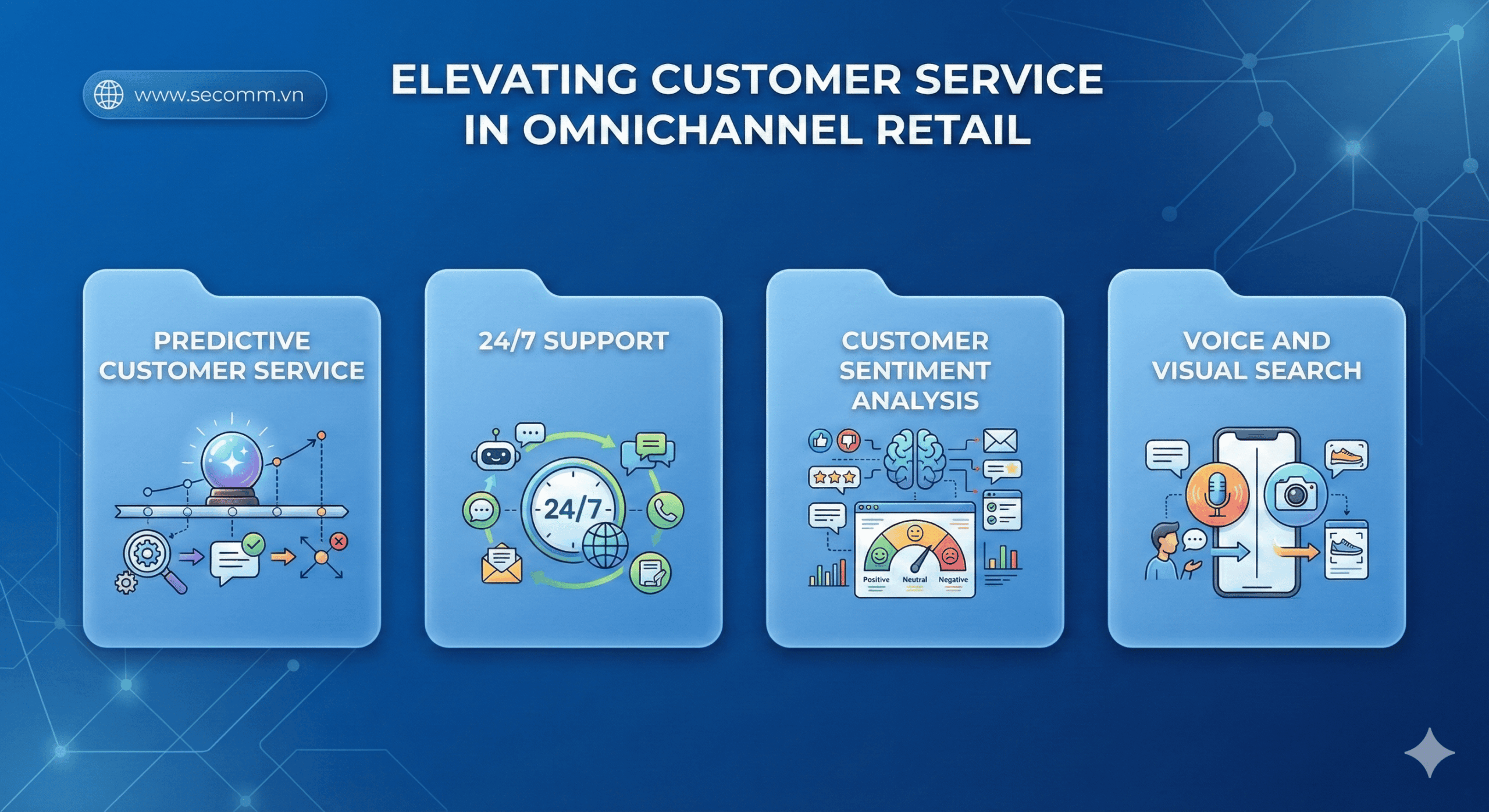
Customer service is a core component of the omnichannel experience, and AI is redefining how retailers engage with shoppers across touchpoints. From virtual assistants to AI-powered analytics, these tools ensure every interaction is more efficient and more relevant.
AI can anticipate support needs before customers submit a ticket. For example, if a customer repeatedly returns a specific product, AI can flag this pattern and alert the customer service team to proactively reach out. This level of predictive service helps reduce churn and strengthens brand loyalty.
AI-powered chatbots and virtual assistants provide round-the-clock support across all channels, reducing waiting times and enhancing customer satisfaction. These virtual agents can handle routine inquiries, track orders, and assist with returns, freeing human agents to focus on complex, high-value interactions.
AI-based sentiment analysis tools allow retailers to monitor customer satisfaction by analyzing feedback across social media, email, and support tickets. The technology can detect negative sentiment in real time, enabling teams to take immediate corrective action to protect the customer experience.
With AI, retailers can offer voice search, allowing customers to find products without typing, which is especially impactful on mobile. Visual search lets shoppers upload images to discover similar items, delivering a more intuitive and convenient product discovery experience aligned with modern consumer behavior.
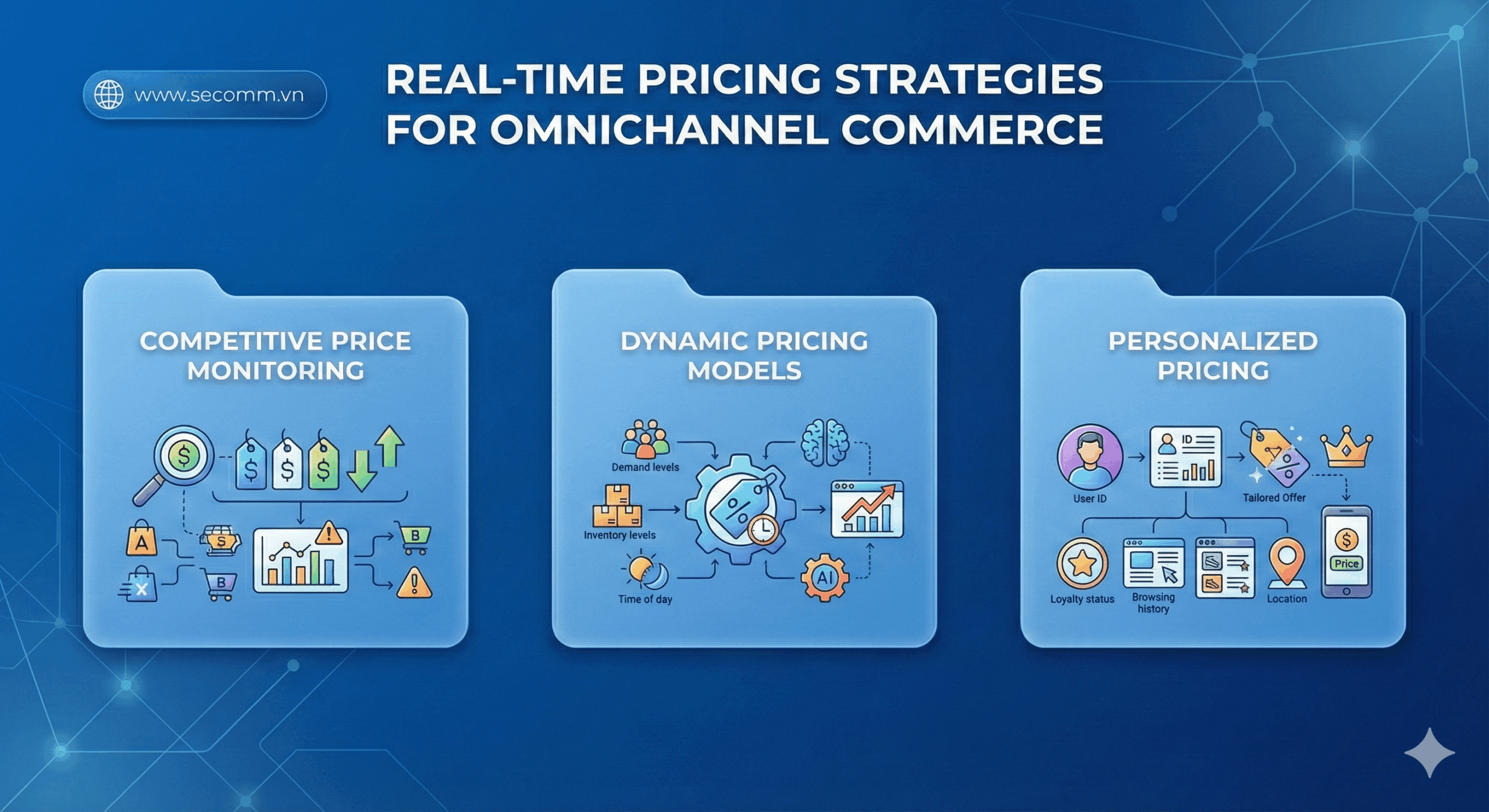
Dynamic pricing is another powerful AI use case, allowing retailers to adjust prices in real time based on demand, competition, and other market variables. This is particularly important for omnichannel retail, where price consistency and responsiveness are critical to customer trust.
AI algorithms can continuously monitor competitors’ prices and adjust a retailer’s prices accordingly, helping maintain competitiveness while protecting margins. This is essential in an environment where customers can compare prices across platforms within seconds.
By leveraging historical sales data, seasonal trends, and customer behavior, AI models can determine optimal price points to maximize both revenue and profit. For instance, AI can increase prices during peak demand periods or trigger markdowns for slow-moving inventory to accelerate sell-through.
Personalized pricing focuses on offering individual discounts or loyalty incentives based on each customer’s shopping behavior. By analyzing purchase frequency, loyalty, and spending patterns, AI can generate tailored offers that drive engagement and increase customer lifetime value.
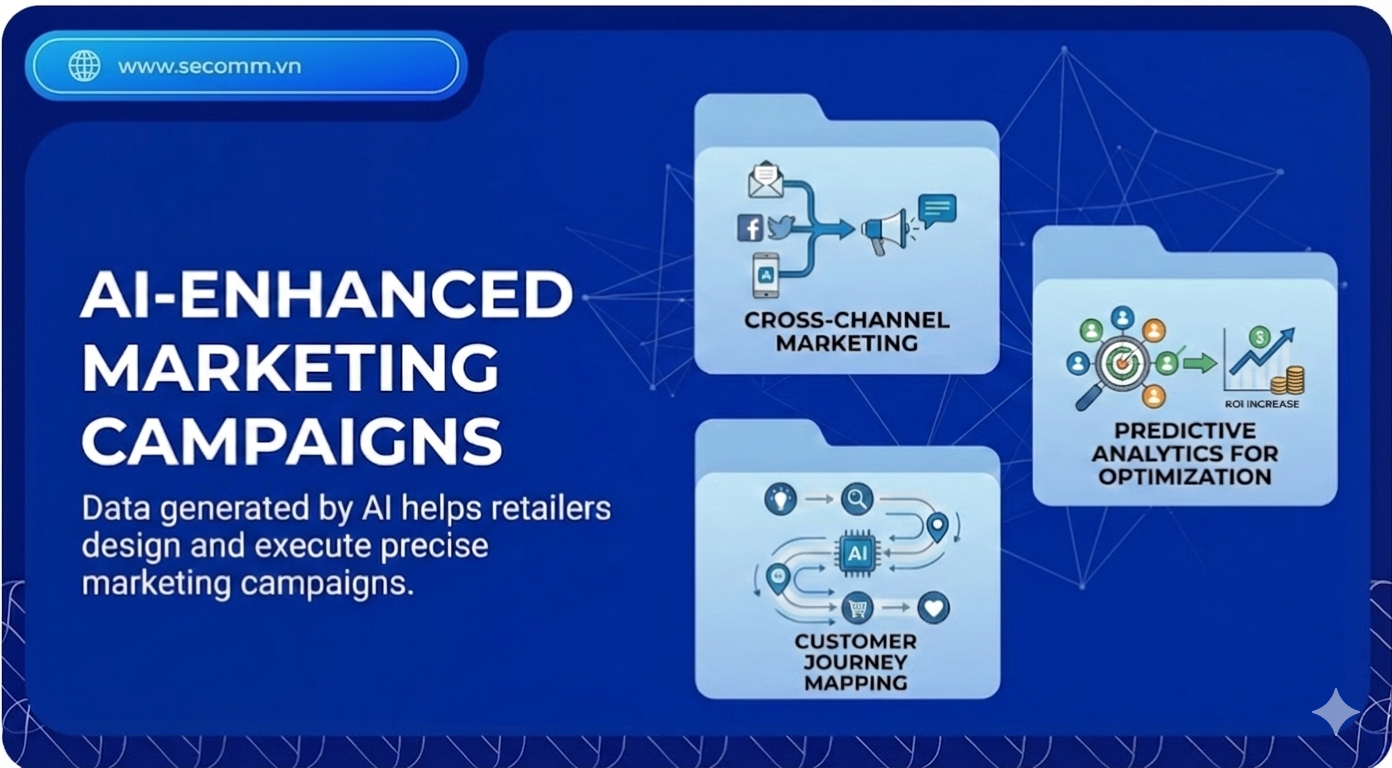
AI-generated insights empower retailers to design and execute more precise marketing campaigns, ensuring they reach the right customers at the right time. Multichannel data analysis makes marketing strategies more targeted and more efficient.
AI enables retailers to orchestrate integrated omnichannel marketing campaigns that reach customers via email, social media, mobile apps, and other digital touchpoints. This integration ensures consistent messaging, regardless of where customers interact with the brand.
Predictive analytics can identify which customer segments are most likely to respond to a given promotion, allowing marketers to optimize budget allocation. Campaigns can be adjusted in real time based on performance metrics, increasing ROI and engagement rates.
With AI, retailers can build detailed customer journey maps to understand how each touchpoint influences purchase decisions. This data supports hyper-targeted marketing at every stage-from awareness and consideration to conversion-enabling businesses to design strategies aligned with customer needs at each step.
While AI offers transformative advantages for Omnichannel retail, practical implementation remains fraught with strategic hurdles. To fully harness the potential of this technology, enterprises must identify and resolve four core challenges:
Faced with complex operational and data architecture challenges, businesses require a partner with proven technical expertise. With extensive experience in deploying complex eCommerce systems, SECOMM stands as a reliable partner, helping enterprises mitigate technical risks, optimize costs, and accelerate time-to-market.
Read more: Strategies for Applying AI in eCommerce to Enhance Operational Efficiency and Sales
AI is transforming omnichannel retail by enabling seamless integration across all customer touchpoints, from personalized recommendations to intelligent inventory management. As retailers continue to innovate, AI-driven omnichannel strategies will sit at the heart of superior shopping experiences, stronger brand loyalty, and sustainable profitability.
Are you ready for a new wave of retail transformation in 2026? With more than 10 years of experience delivering specialized eCommerce solutions for leading enterprises in Vietnam and overseas markets, SECOMM is ready to partner with you to build a secure, scalable, and high-performing omnichannel ecosystem.
Contact SECOMM today for tailored omnichannel consulting that aligns with your business model and long-term growth strategy.
 50
50
 5,754
5,754
 0
0
 20
20
In 2021, The Vietnamese eCommerce market size reached 13.7 billion USD, which means the industry is growing rapidly and playing an important role in Vietnam’s economy.
It forces business owners to find ways to make their businesses stand out and connect with customers.
One of the effective approaches is to implement an Omnichannel eCommerce strategy. This is a marketing method aimed at providing a consistent customer experience across multiple channels. It may be confused with Multichannel eCommerce, where brands sell on various channels but provide different customer experiences on each channel. Although customers can shop on social media, eCommerce websites, physical stores, etc, their experience across these channels could not be seamless. There is also the Single-channel eCommerce model, where a brand only uses one channel for sales.
Retailers globally recognize the potential and impact of Omnichannel eCommerce on their business operations. According to Report Linker, the market for multi-channel retail platforms reached 5 billion USD in 2020 and is projected to reach 14.5 billion USD in 2027. Industry analysts and experts also emphasize that Omnichannel is the future of eCommerce and is a great way to attract customers and provide them with true value.
Here are 6 tips to help you, as a business successfully build an Omnichannel eCommerce strategy.
Tip number 1, regardless of any business strategy, you have to know who your target customers are and their shopping behavior. You can start by gathering relevant data about demographic information, purchase history, etc from various sources, including eCommerce websites, social media platforms, physical stores, etc. Then, you will analyze how they interact with the brand across different channels and create detailed buyer personas.
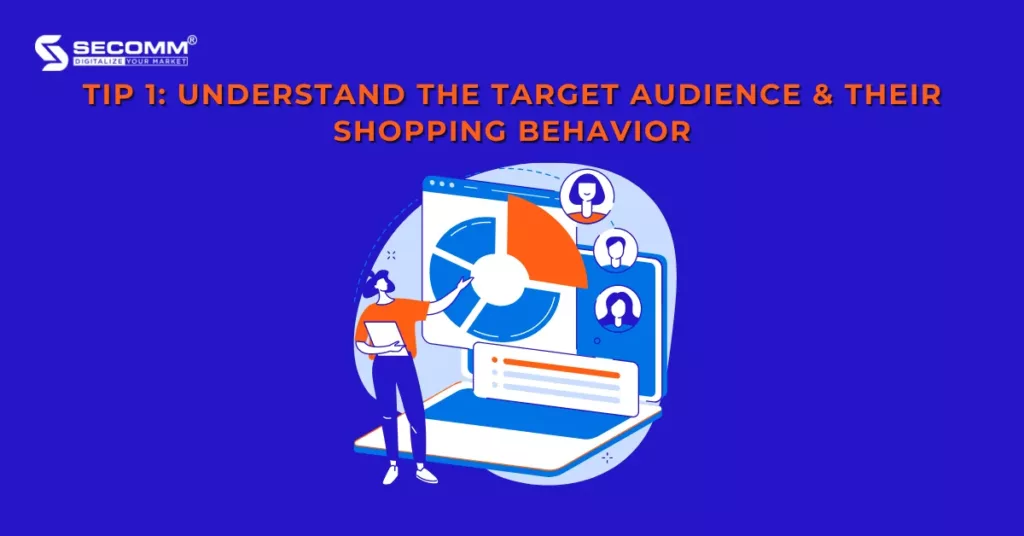
This helps identify effective approaches for each customer segment and tailor messages for each channel. For example, if a significant portion of your customers prefers shopping on mobile devices, you can optimize your suitable marketing campaigns alongside improving the website to attract more customers. Or, you can invest in developing mobile applications to enrich the customer shopping experience and drive conversions.
Tip number 2 is to map out the customer journey to visually understand the process that a potential customer goes through when interacting with your brand. It helps you clearly understand their needs, buying motivations, and so forth. When developing an Omnichannel eCommerce strategy, mapping the customer journey allows you to proactively provide personalized customer experiences across channels. It not only enhances cross-selling, and upselling but also improves customer intention and loyalty.
There are typically 5 stages in the customer journey: Awareness, Interest, Purchase, Retention, and Advocacy.
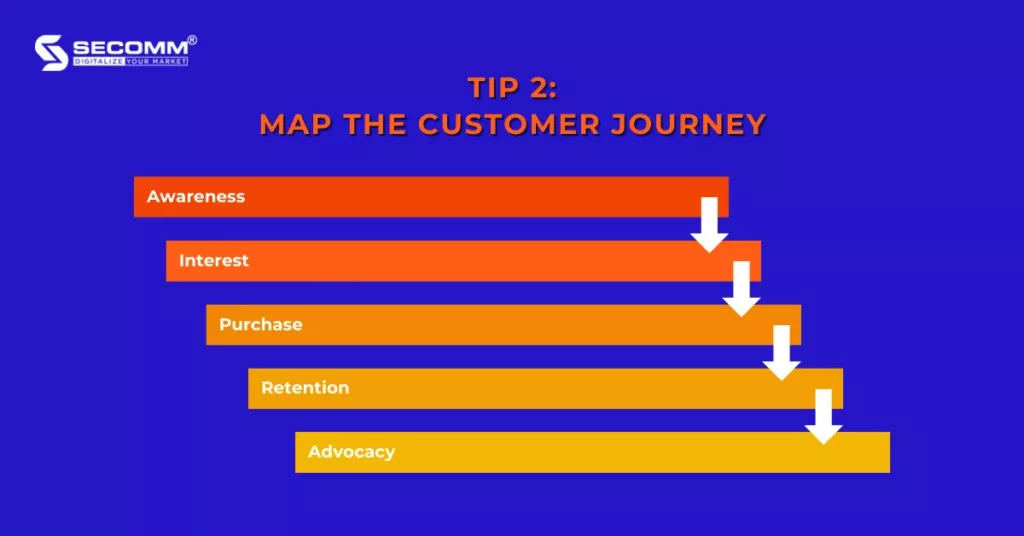
Here are the basic steps to create a customer journey map:
Another valuable tip is to develop a consistent brand message and image across channels. It requires you first to identify and understand the brand values, vision, and mission. For example, you can use consistent elements such as colors, fonts, etc, to help customers easily recognize your brand. Moreover, you need to train your staff on the brand message and image to ensure they understand and communicate the message properly across all channels.

This tip not only helps increase brand recognition and customer loyalty but also creates a seamless customer experience.
Next, you can incorporate social media into your Omnichannel eCommerce strategy and focus on engaging with customers on social media platforms alongside other effective marketing channels. With over 3.6 billion social media users globally, building your brand presence in these places is no longer an option but an imperative measure to effectively connect your brand with customers.
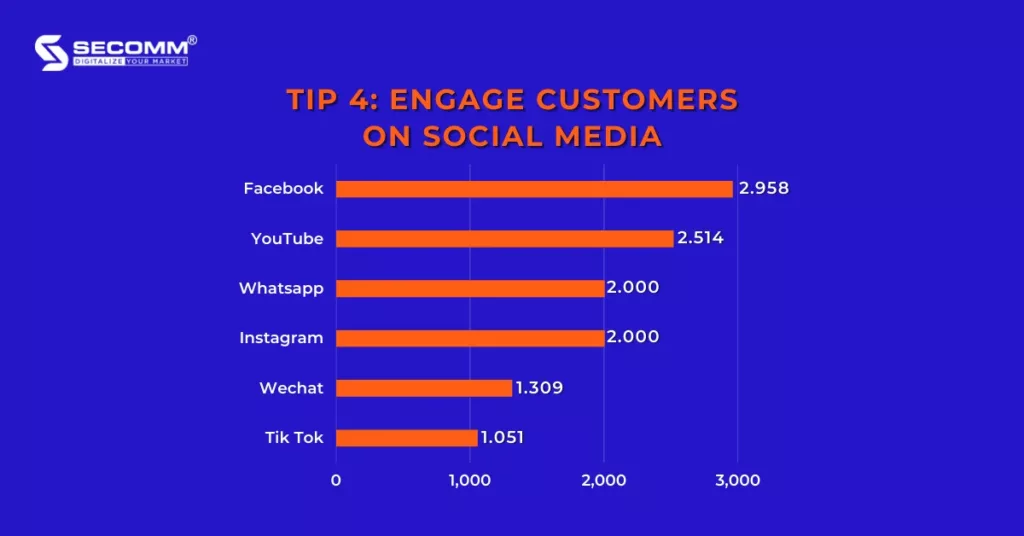
Leveraging social media enables you to engage with customers by responding to inquiries and addressing concerns through messaging or interactions on the news feed in a friendly and approachable manner. In addition, social media provides you with great space to deliver brand messages and voices to customers in a quicker and more intimate way to enhance brand awareness. You can create your own ideas and content or collaborate with influencers.
To tightly integrate social media with other channels in the Omnichannel eCommerce strategy, you can, for example, encourage users to like, comment, and share posts to receive attractive discount codes for purchases on websites or physical stores.
Tip number 5, for a seamless omnichannel experience, you need to ensure that customers can make purchases through any channel they interact with, such as eCommerce websites, marketplaces, social media platforms, and physical stores.
Additionally, to keep up with mobile commerce trends, you should optimize mobile-friendly and responsive websites as well as user-friendly mobile apps for easy navigation and usage.
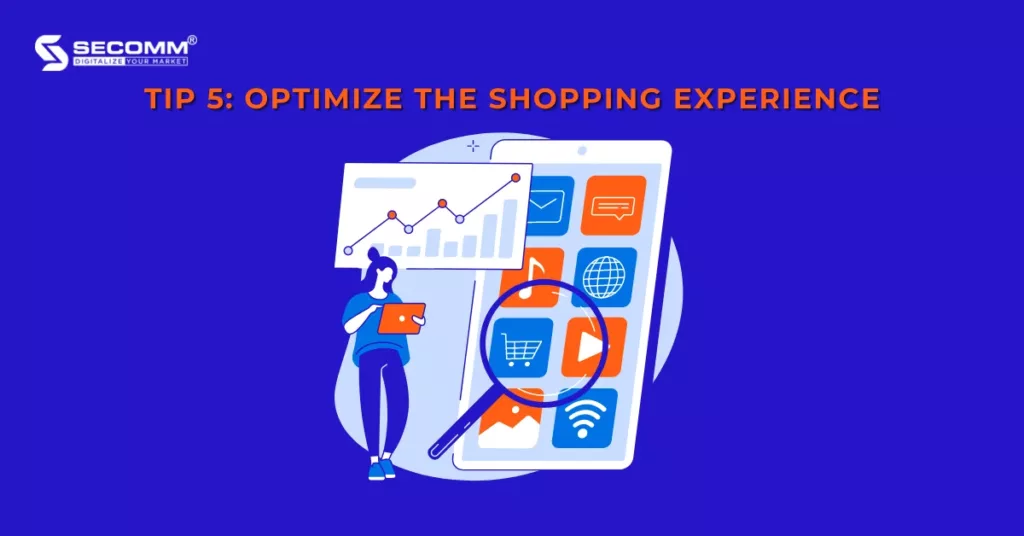
Since Omnichannel eCommerce emphasizes consistent experiences across all channels, content and customer-related information such as login credentials, payment details, and shopping carts should be synchronized. This enables customers to move seamlessly between channels and devices while preserving the items in their shopping carts or without the need to spend time logging in or re-entering payment information. Moreover, you can leverage data analytics to personalize product recommendations for each customer, displaying relevant or complementary products based on their behavior and purchase history across channels to increase cross-selling and upselling opportunities.
Tip number 6 is measuring and analyzing the results of the strategy. During the implementation process, you can utilize data analysis tools such as Google Analytics, Google Tag Manager, Facebook Pixel, and others to check, track and analyze customers across all channels. It helps identify which channels generate the most traffic, level of engagement, and sales revenue, and identify areas for improvement. In addition, you can gather customer feedback to enhance and optimize your strategy. The work should be conducted to make appropriate adjustments and achieve desired results.

Contact SECOMM now for a consultation on building an Omnichannel eCommerce strategy.
 2
2
 8,768
8,768
 0
0
 1
1Subscribe to get the latest eBook!
Hotline